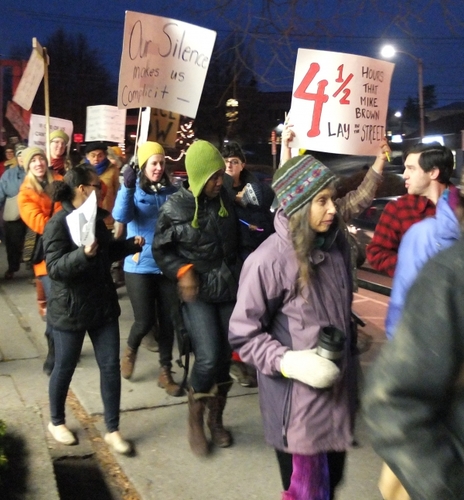BRATTLEBORO — The group grew in numbers as it streamed down the sidewalk from the Municipal Center, down Main Street to Malfunction Junction.
Parents held their toddlers by the hands, and a woman carried a sign that read, “Stop Cops.”
A young man called “No Peace!” and the group responded “No Justice!”
A small boy in a red jacket held a small sign printed in bold lettering: Black lives matter.
The Dec. 5 march was the second in as many weeks to show solidarity for people living in communities like Ferguson, Mo., Staten Island, N.Y., and other cities around the nation in the wake of increased police violence toward people of color.
Marchers on Friday night also protested the racism endemic in society and institutions like law enforcement and the justice system that disproportionately affect communities of color and the poor.
According to a report by Texas-based nonprofit Grassroots Leadership, in 2013, Vermont's prison population totaled approximately 2,100. Of those prisoners, 40 percent were jailed for non-violent crimes.
African-Americans make up a disproportionate number of Vermont's prison population, according to the report. While comprising only 1.2 percent of the state's population, African-Americans made up 9.5 percent of its prison population last year.
“Our nation's history of racial disparities in policing and sentencing is an injustice that persists today and continues to devastate communities of color across the United States,” said the report.
In the early evening darkness, the group of marchers strode past a snarl of rush-hour traffic to the intersection of Main and High streets.
The traffic lights turned red, and the pedestrian walk chirp sounded. More than 60 people moved into the intersection, calling “Hey-hey, ho-ho, this racist system's got to go!”
Drivers craned their necks to see what was happening. Some beeped and gave the marchers a thumbs-up. Other drivers, annoyed, beeped their horns as marchers slowly made their way.
At the Main Street and Elliot Street intersection, the scene was repeated.
“Maybe they wouldn't have been shot if they'd gotten out of the road,” one passenger called from the window of a car delayed by the marchers, who continued to Malfunction Junction.
Participants had heard of the evening's march through email, Facebook messages, and word of mouth. While some of the faces were familiar - long-time activists who regularly participate in community issues - many of the younger faces were unfamiliar to those on the municipal stage. The march attracted a demographic not regularly seen at community events, Selectboard meetings, School Board meetings, or on Election Day.
The march itself lasted over an hour, but participants continued to talk long after the intersections cleared.
Beyond the march
To further the conversation about the effect institutional racism and oppression has on communities of color and the poor, the Root Social Justice Center on Williams Street will host a community forum on Sunday, Dec. 14, from 2 to 5 p.m.
“Our country is grappling with what the poor and communities of color have known for a long time - class oppression and racism are alive and well,” write the forum's organizers.
The organizers also hope to help Vermonters see the connection between “local, national, and global realities of institutional oppression, and the kind of action that can move us forward.”
The forum is in partnership with The Root, Mark Loevy-Reyes, and Mikaela Simms of Spark Teacher Education Institute.
Shela Linton, a community organizer for the Vermont Workers' Center and a member of the The Root, marched Friday night.
In a separate interview, Linton, a woman of color, said it's important to connect Vermonters to what she described as a national epidemic of racism.
Many people feel removed from what they see happening in places like Ferguson, said Linton. They think, “Not in my town,” she said.
Police brutality, in general, is an issue for everyone, said Linton. But no one can forget that race plays a huge role for many people, she added.
“We shouldn't need a [policy] to tell people how to act - how to treat people with dignity,” she said.
Linton said the police violence against young black men like Michael Brown makes her worry for her older brother's safety. And she said a friend in Burlington told her recently that she's scared for her 5-year-old black son.
That's the reason Ferguson hurts, Linton said.
Linton, the mother of two daughters, said she catches herself thinking, “Thank you, God, that I have girls.”
“That's a problem,” she said.
